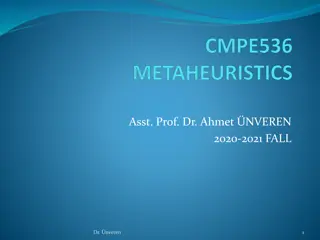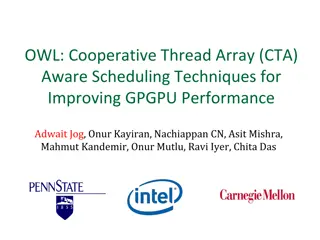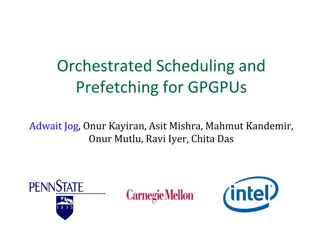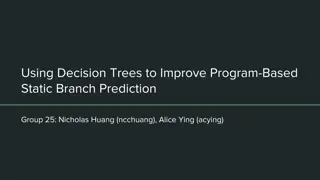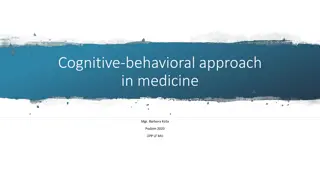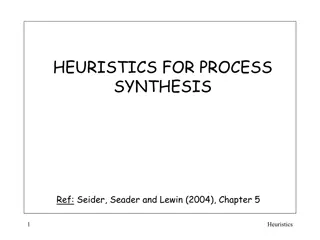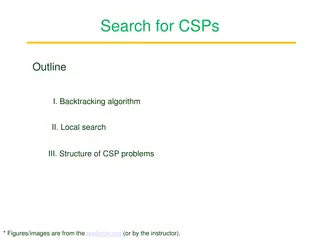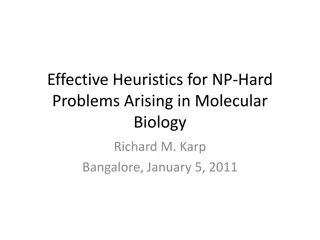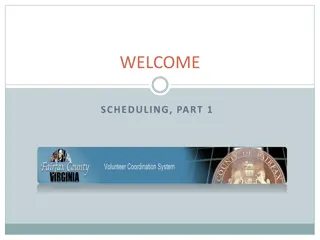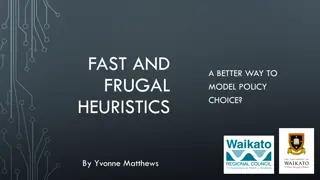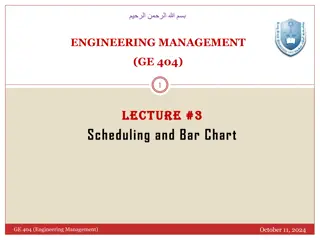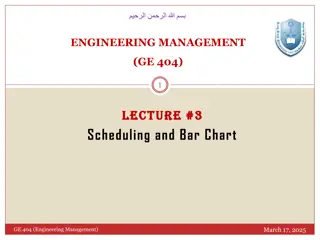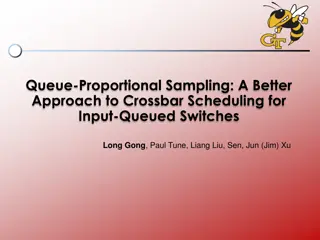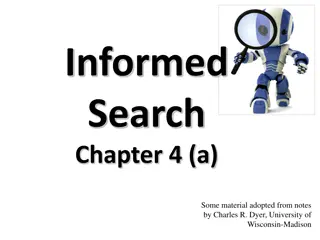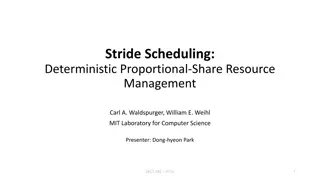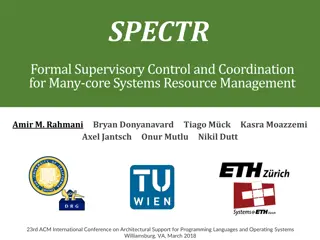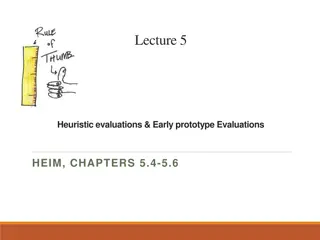Course Overview: Heuristics and Metaheuristics in Operations Research
Explore the practical issues, methods of assessment, recommended textbooks, course catalogue description, aims, and objectives of the course taught by Asst. Prof. Dr. Ahmet NVEREN on Heuristics and Metaheuristics. The course delves into various heuristic methods, metaheuristics, and optimization tec
5 views • 6 slides
Heuristic Evaluation in User Interface Design
Heuristic evaluation is an analytical method where experts evaluate interfaces based on usability principles. This evaluation helps in identifying potential design issues that may impact user satisfaction. The process involves a small group of evaluators reviewing the interface against a set of reco
6 views • 12 slides
GPU Scheduling Strategies: Maximizing Performance with Cache-Conscious Wavefront Scheduling
Explore GPU scheduling strategies including Loose Round Robin (LRR) for maximizing performance by efficiently managing warps, Cache-Conscious Wavefront Scheduling for improved cache utilization, and Greedy-then-oldest (GTO) scheduling to enhance cache locality. Learn how these techniques optimize GP
1 views • 21 slides
Time-Aware Scheduling Capabilities in IEEE 802.11be
Describing necessary enhancements to enable Time-Aware Scheduling in IEEE 802.11be for time-sensitive applications. The focus is on aligning with the 802.1Qbv standard to address latency, jitter, and reliability issues, presenting a structured outline of requirements and configurations essential for
1 views • 24 slides
Scheduling Algorithms in Operating Systems
Exploring the world of scheduling in operating systems, this content covers various aspects such as introduction to scheduling, process behavior, bursts of CPU usage, CPU-bound and I/O-bound processes, when to schedule processes, and the differences between non-preemptive and preemptive scheduling a
1 views • 34 slides
Eight Puzzle Solver Implementation in Python
Explore a simple implementation of an eight puzzle solver in Python using the A* algorithm with three different heuristics (nil, out of place tiles, Manhattan distance). The implementation involves modeling states, defining legal actions, determining state transitions based on actions, and utilizing
5 views • 11 slides
Improving GPGPU Performance with Cooperative Thread Array Scheduling Techniques
Limited DRAM bandwidth poses a critical bottleneck in GPU performance, necessitating a comprehensive scheduling policy to reduce cache miss rates, enhance DRAM bandwidth, and improve latency hiding for GPUs. The CTA-aware scheduling techniques presented address these challenges by optimizing resourc
0 views • 33 slides
Simplifying Residency Shift Scheduling with Mathematical Programming Techniques
This project, led by Professor Amy Cohn and William Pozehl, aims to demonstrate how mathematical programming techniques can simplify the complex task of residency shift scheduling. The Residency Shift Scheduling Game highlights the challenges of manual scheduling and the ease of using mathematical p
1 views • 37 slides
Theoretical Justification of Popular Link Prediction Heuristics
This content discusses the theoretical justification of popular link prediction heuristics such as predicting connections between nodes based on common neighbors, shortest paths, and weights assigned to low-degree common neighbors. It also explores link prediction generative models and previous empi
1 views • 39 slides
Orchestrated Scheduling and Prefetching for GPGPUs
This paper discusses the implementation of an orchestrated scheduling and prefetching mechanism for GPGPUs to enhance system performance by improving IPC and overall warp scheduling policies. It presents a prefetch-aware warp scheduler proposal aiming to make a simple prefetcher more capable, result
2 views • 46 slides
Using Decision Trees for Program-Based Static Branch Prediction
This presentation discusses the use of decision trees to enhance program-based static branch prediction, focusing on improving the Ball and Larus heuristics. It covers the importance of static branch prediction, motivation behind the research, goals of the study, and background on Ball and Larus heu
1 views • 36 slides
Efficient Department Scheduling for Timetabling Success
Efficient timetabling for a department involves various stages like data entry, draft timetable creation, feedback collection, production of the final timetable, schedule adjustments, and publication. Key information needed includes faculty availability, room inventory, specific scheduling parameter
1 views • 59 slides
Cognitive Behavioral Approach in Medicine: A Heuristic Perspective
Cognitive-behavioral approach in medicine, analyzed through affective heuristics and problem-solving heuristics, explores factors influencing decision-making processes and the dual processes theory. Key concepts include fast emotional reactions, reliance on emotion in judgment, reducing cognitive lo
1 views • 30 slides
Heuristics for Process Synthesis
This lecture explains heuristic rules that expedite the selection and positioning of processing operations in assembling flowsheets for process synthesis. The importance of selecting non-toxic reaction paths, distributing chemicals effectively, and applying heuristics in separation processes is high
1 views • 46 slides
Overview of CSP Algorithms and Techniques
Explore the key concepts of Constraint Satisfaction Problems (CSPs) including backtracking search, local search, and the structure of CSP problems. Learn about important algorithms such as depth-limited search and heuristics like Minimum Remaining Values (MRV) and Degree Heuristics. Discover the com
3 views • 22 slides
Analysis of Branching Heuristics in SAT Solvers
This content delves into various branching heuristics used in SAT solvers, such as Exponential Recency Weighted Average, Conflict History-Based, and Tie-break of VSIDS. It discusses the decision-making processes of solvers and compares different approaches to handle ties and improve solver performan
0 views • 16 slides
Job Scheduling Across Geo-distributed Datacenters
Scheduling jobs across geo-distributed datacenters poses challenges such as optimizing job completion time, reducing data transfer costs, and coordinating tasks across multiple locations. Various strategies like reordering-based approaches and scheduling heuristics are explored to enhance job schedu
0 views • 32 slides
Insights into NP-Hard Problems in Molecular Biology and Genetics
Understanding the complexity of NP-Hard Problems arising in molecular biology and genetics is crucial. These problems involve genome sequencing, global alignment of multiple genomes, identifying relations through genome comparison, discovering dysregulated pathways in human diseases, and finding spe
0 views • 24 slides
Insights into Volunteer Scheduling and Management
Exploring the intricacies of volunteer scheduling, this informative guide covers topics such as creating schedule slots, weighing the pros and cons of scheduling, opportunity scheduling, monthly calendars, slot summaries, volunteer and opportunity listings, and more. Dive into the world of volunteer
0 views • 21 slides
Gate Scheduling at Airports: Optimization and Solutions
Allocating gates efficiently at airports is crucial for managing air traffic. Gate scheduling involves assigning flights to stands while considering constraints and objectives like minimizing un-gated activities and passenger walking distance. Various methods such as linear programming, heuristics,
0 views • 11 slides
Fast and Frugal Heuristics in Decision Making
Exploring the concept of fast-and-frugal heuristics as a better way to model policy choice for decision making in uncertain environments. The discussion covers uncertainty terminology, introduction to heuristics, how people actually make decisions, and models of decision making incorporating fast-an
0 views • 18 slides
Overview of Project Scheduling in Engineering Management
The lecture covers planning and scheduling in engineering management, focusing on activity and event scheduling techniques, bar charts, critical path analysis, and addressing project scheduling principles. It discusses the objectives of the lecture, the difference between planning and scheduling, th
0 views • 29 slides
Criticizing Solutions to Relaxed Models Yields Powerful Heuristics
The effectiveness of criticizing solutions to relaxed models in generating powerful and admissible heuristics for optimization problems. Dive into concepts like branch-and-bound necessity, optimality in search algorithms, and the application of A* algorithm for finding optimal solutions. Discover ho
0 views • 30 slides
Generation of Heuristics & A* Variations
This content delves into the generation of heuristics and variations of the A* search algorithm in the realm of Artificial Intelligence. It covers topics such as yielding better heuristics, deriving heuristics through relaxation, admissibility, consistency, heuristics from formal problem specificati
0 views • 16 slides
Adaptive Online Scheduling in Storm
Leveraging adaptive scheduling techniques in the Storm framework to optimize network traffic by grouping communicating executors, this paper explores offline and online scheduling strategies for efficient data processing in high throughput streams. By using heuristics and runtime analysis, network c
0 views • 58 slides
Effective Project Scheduling for Engineering Management Students
This lecture on project scheduling in Engineering Management covers the importance of planning and scheduling, techniques like bar charts and critical path analysis, and key considerations such as resource allocation and project duration. The content discusses the difference between planning and sch
0 views • 29 slides
Optimizing Program Efficiency with Global Profitability Heuristics
Explore how Global Profitability Heuristics mitigate phase ordering problems and enhance program efficiency through CFG PEG conversion, equality saturation, and more. Learn about non-destructive updates and referential transparency in program representation.
0 views • 28 slides
Queue-Proportional Sampling: A Better Approach to Crossbar Scheduling
Learn about Queue-Proportional Sampling, a new approach to crossbar scheduling for input-queued switches. Explore the proposed algorithm, simulation results, and conclusions presented in the research paper. Understand the challenges and constraints associated with scheduling for input-queued crossba
0 views • 45 slides
Understanding CPU Scheduling in Operating Systems
Learn about the importance of CPU scheduling in operating systems, the different scheduling schemes, criteria for comparing scheduling algorithms, and popular CPU scheduling algorithms like FCFS and SJF.
0 views • 21 slides
CPU Scheduling in Operating Systems
Understand the basic concepts of CPU scheduling in operating systems, including multiprogramming, CPU/I/O burst cycles, and preemptive scheduling. Explore the differences between I/O-bound and CPU-bound programs, and learn about scheduling strategies to maximize CPU utilization. Discover how preempt
1 views • 40 slides
Understanding Greedy Algorithms for Scheduling Theory in CSE 417
Dive into the concepts of Greedy Algorithms and Scheduling Theory in CSE 417. Explore topics like Interval Scheduling, Topological Sort Algorithm, and the application of Greedy Algorithms for task scheduling. Enhance your understanding with examples and simulations to solve complex scheduling proble
0 views • 24 slides
Key Usability Heuristics for Interaction Design
Explore the fundamental usability heuristics for designing user-friendly interfaces, including principles like system status visibility, real-world match, user control, and consistency standards. Examples and explanations provided highlight the importance of these principles in creating effective us
0 views • 16 slides
Effective Solution Methods for NP-Hard Discrete Optimization Problems
Explore solution methods for NP-hard discrete optimization problems, including Integer Programming techniques, Approximation Algorithms, and Heuristics. Learn about the trade-offs between time and accuracy, and the different approaches such as IP-based solution methods. Discover heuristics, approxim
0 views • 6 slides
Understanding Memory Systems: Heuristics, Allocation, and Fragmentation
Explore the intricacies of memory systems, including heuristics for allocation, memory fragmentation, and managing free frames. Learn about different algorithms for allocating memory and handling internal and external fragmentation in this insightful chapter by Smruti R. Sarangi from IIT Delhi.
0 views • 97 slides
Understanding Heuristics in Informed Search Methods
Explore the concept of heuristics in informed search methods, where domain-specific information is utilized to determine the best path for searching. Learn about heuristic functions, weak vs. strong methods, and examples of heuristics in problem-solving.
0 views • 26 slides
Theoretical Justification of Link Prediction Heuristics
Explore the theoretical basis behind link prediction heuristics in network analysis, delving into strategies to predict connections between nodes based on common neighbors, shortest paths, and empirical studies. Discover how generative models aid in recommending connections in various scenarios.
0 views • 23 slides
Understanding State Space Search and Admissible Heuristics
Explore the concepts of state space search, heuristic functions, and admissibility in search algorithms. Learn about evaluating heuristics, informedness, monotonicity, and the importance of admissibility for finding optimal solutions efficiently.
1 views • 13 slides
Understanding Stride Scheduling for Resource Management
Explore the concepts of Stride Scheduling for deterministic proportional-share resource management introduced by Carl A. Waldspurger and William E. Weihl. Learn about its basic algorithm, client variables, and advantages over other scheduling methods such as Lottery Scheduling. Dive into the world o
0 views • 18 slides
Formal Supervisory Control and Coordination for Many-core Systems
Explore how Formal Supervisory Control Theory (SCT) combines classical control theory and heuristics to meet changing runtime goals, offering a systematic design flow for hierarchical control. This approach addresses robustness, formalism, efficiency, coordination, scalability, autonomy, machine lea
0 views • 8 slides
Heuristic Evaluations and Early Prototypes in Usability Testing
Explore the importance of heuristic evaluations and early prototypes in usability testing, focusing on Nielsen's heuristics and evaluation challenges. Understand how experts assess system usability, determine predicted, false, missed, and actual problems, and the value of heuristic evaluation in stu
0 views • 18 slides
